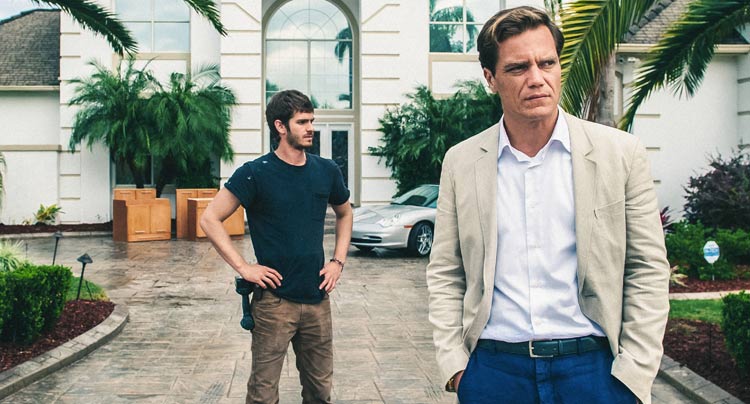
It’s a big step towards the mainstream for Bahrani, boasting a terrific cast and a relevant subject.

It’s a big step towards the mainstream for Bahrani, boasting a terrific cast and a relevant subject.
Ramin Bahrani makes a loud return with 99 Homes, his follow-up to the disappointingly received At Any Price. Taking his aim at the U.S. housing crisis, Bahrani tells a gripping story that extends out to a damning statement on American capitalism and the exceedingly wealthy one percent. It’s a big step towards the mainstream for Bahrani, boasting a terrific cast and a relevant, necessary subject. And even with a problematic final act, one threatening to sink the entire film, its dramatic strengths end up winning out.
From the first frames, Bahrani blatantly expresses his intentions to generate ire from viewers. Real estate shark Rick Carver (Michael Shannon) looks at a bathroom covered in blood with a body on the toilet. Carver came to evict the homeowner for defaulting on his mortgage, and the owner decided to take his own life rather than vacate. Carver doesn’t care; he tells police the man’s suicide is a selfish act, one that leaves the homeowner’s family to fend for themselves. Within minutes, Bahrani establishes the cruel, emotionless world of his film.
Carver’s next person to evict is Dennis Nash (Andrew Garfield), a construction worker down on his luck. With the housing market crashing, no one has any interest in building homes, meaning little to no construction work. Due to issues with the bank, Nash loses the family home, leaving his mother Lynn (Laura Dern) and son Connor (Noah Lomax) with nowhere to go. Eventually Rick and Dennis’ paths cross again, and Rick ends up hiring Dennis to help clean out vacated homes for him. Dennis resists the idea of working for the man who kicked him out of his home at first, but the high paychecks prove to be too tempting.
Bahrani’s point, along with co-writer Amir Naderi (taken from a story by Bahrani and Bahareh Azimi), is to show the way capitalism has morphed into something monstrous. Nash represents the average hard-working American earning their own success, while Carver symbolizes the way success now defines itself as profiting off the suffering of the less fortunate. Carver’s philosophy on life leaves no room for sentiment or emotions. Dennis continually finds ways to get his family home back, something Carver finds ridiculous. “They’re just boxes,” Carver says to Nash. Bahrani uses Nash and his family to keep the human story elements at the forefront, making Carver’s soulless statements look all the more horrifying.
Garfield does a great job as Nash, giving a believable and emotional performance, but the real highlight is Michael Shannon. Playing a character written as a total villain, Shannon exudes a level of charisma that, combined with having to say most of the film’s more memorable lines, actually makes Carver enjoyable to watch. And even though he’s a cruel, unsympathetic character, his motivations and back story are fleshed out to make his behavior understandable. Carver, like Nash, simply does what he can to survive and prosper, except one of them is willing to go much further than the other to ensure their security.
Sadly, Bahrani feels the need to up the ante of his dramatic stakes, using a major plot point in the latter half to shift things into thriller territory. As the intensity builds, or at least tries to, so does the unsubtle political commentary. It’s an unfortunate move because the last thing the film needs is more emphasis. For that reason the climax falls flat, a stale effort to go out strong turning into poorly misguided melodrama.
Bahrani’s 99 Homes is still a success, even if it’s a small one. Its great cast and effective drama, at least for the majority of the film, are undeniably compelling. If At Any Price is Bahrani’s failed attempt to break into the major leagues, 99 Homes corrects that mistake.
Originally published as part of our coverage for the 2014 Toronto International Film Festival.